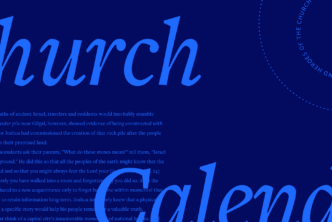Creeds and confessions are precious gifts to the church of the present from the church of the past, through the work of the Spirit.1 They summarize the beliefs Christians have studied, worked, debated—and even died—to state clearly from Scripture. Creeds2 are more general, usually shorter, and often more broadly accepted than confessions.3 But both types of statements teach us, challenge us, and give us guardrails for our own faith.
Because creeds and confessions come to us from the past, their language eventually grows archaic to modern ears. At that point, we face the question of updating the language. Since these statements have historical significance, we hesitate to change them at all. Their form of words becomes familiar to us, even if that form doesn’t communicate as clearly as it did in the past.
Should we ever update a creed or confession? If so, at what point? And if we do it, what principles should apply?
We’re not considering the question of changing the meaning of a historic statement. That is a different issue entirely, one we’ll touch on briefly. Our focus here is about updating the language.
We are sometimes confronted with compelling reasons to update a creed or confession. These statements have such significance that they need to be accessible in every age and in every language. But if they are to be updated, some key principles must be followed to preserve their value to the people of God.
Enduring value
Some Christians are wary of written statements of belief other than the Bible. They rightly recognize that these statements are not infallible as Scripture is. However, to the degree that they summarize and restate Scripture, they can be incredibly valuable—and, to that same degree, they carry Scripture’s authority.
Commending early consensus
We consider sermons to be edifying, and we even refer to them as “the word preached.” We are told in Ephesians 4:11–16 that God has given teachers to the church to build up the body into mature, steady adulthood in Christ. If individual teachers provide that blessing to the church, then how much more might a great number of teachers, building on one another’s study, and drawing firm conclusions from the Bible—how much more might they write these conclusions down for the benefit of present and future members of the body? Would that not be a vastly greater blessing? That’s exactly what creeds and confessions are.
These documents provide important blessings to the church. They are responses of obedience. They fulfill the commands:
- to teach what accords with sound doctrine (Titus 2:1)
- to hold to the traditions of the apostles (2 Thess 2:15)
- to hold the mystery of the faith with a clear conscience (1 Tim 3:9)
- to remember and hold fast to the things of first importance (1 Cor 15:1–3)
- to hold fast the confession of our hope (Heb 10:23)
- to follow the pattern of sound words (2 Tim 1:13)
- to guard the deposit entrusted to you (2 Tim 1:14)
- and not to be ashamed of the testimony of our Lord (2 Tim 1:8).
On top of all these commands, we have the pattern of the New Testament writers committing truth to writing for the sake of those not present. While the writing of a creed or confession is not infallible, it is nonetheless useful to the degree that it reflects the testimony of Scripture.
Confirming the authority of Scripture
Creeds and confessions also promote and confirm the authority of Scripture. They do not compete with Scripture. On the contrary, they assume its authority or explicitly state it.4 The very aim is to state in summary form what the writers believe the Scriptures teach on the subject addressed.
Summarizing Scripture
Because creeds and confession are carefully crafted and time-tested summaries of scriptural doctrine, they serve as an excellent tool for summarizing and teaching the doctrines of Scripture in a clear and systematic way. The Thirty-Nine Articles of the Church of England, for example, outlines thirty-nine doctrinal topics that include theology proper, Christology, soteriology, the sacraments, ecclesiology, and the relationship of church and state. Anyone who studies this statement will gain an excellent overview of the main points of the Christian faith, stated with care and clarity and with an eye to the past wisdom of the church handed down to that point.
For the same reasons that creeds and confession are excellent teaching tools, they also excel for evaluating the teaching of present-day churches and teachers. If it was true when it was written, it is still true now. If a church or pastor departs from these historic standards, great caution should be exercised by the church before accepting the new teaching over the tried-and-true testimony of God’s gifted men down through the ages.
Reasons for updating creeds and confessions
Since creeds and confessions have enduring value for the church, we who have received them have a difficult but compelling duty before us. We must preserve the time-tested, historic value of these statements but also make sure they communicate clearly to the church of our day. At times, this may mean we have to consider updating the language.
Stylistic differences
The early creeds were written in Greek and/or Latin and translated into English. Most of the earlier denominational confessions were written or translated into English during the Reformation era or the Puritan era. As a result, most creeds and confessions familiar to English-speaking churches were written or initially translated into early modern English—the same English era reflected in the Authorized Version (KJV) of the Bible. The English language has evolved significantly since that time, and this is reflected in the numerous efforts to produce English translations of the Bible into the English of today.
There are notable stylistic differences from early modern English—sentence structure and length as well as punctuation conventions, for instance. And archaic forms such as “thee,” “thou,” and “openest” sound solemn and grandiloquent to modern readers, even when they were not originally intended that way.
Lost and changed vocabulary
Some words and phrases in the confessions, as they’ve come down to us, are simply dead, no longer present in contemporary forms of English: “withal,” “bound over,” “vouchsafeth.” These words aren’t just hard; they’re dead.5
Most importantly, some words in Reformation-era confessions now mean something different from what they meant when they were penned. “Quick,” “prevent,” and “conversation” are well-known examples from the KJV of words whose meanings have changed radically. The Westminster Confession, though thirty-five years younger than the KJV, contains such words as well. Consider “vulgar,” “authentical,” and “terrible”:
- “Vulgar” in a phrase like “translated into the vulgar language of every nation” (WCF 1.8) used to mean “common”; now it means “coarse” or “rude.”
- “Authentical” in a sentence like “The Old Testament in Hebrew … and the New Testament in Greek … are therefore authentical” (WCF 1.8) used to mean “authoritative”; now it means “genuine” (i.e., authentic).
- “Terrible” in a sentence like “terrible in his judgments” (WCF 2.1) used to mean “awe-inspiring”; now it means “incompetent” or “distressingly bad.”
One could argue that Christian people “ought to know” that “vulgar” meant “common,” that they ought to use a dictionary rather than expect historic language to be “dumbed down” to their level. But even educated people don’t always realize they are misunderstanding such words; and how can anyone—educated or not—look up words they don’t realize they’re misunderstanding?
“Confusion,” “passions,” “dispensation,” and “evangelical” are yet more terms that can be misleading to modern readers. The more such words there are, and there are dozens in the Westminster Confession alone, the less utility a confession has as a teaching tool for the church.

8 principles for updates
At some point, because of the inevitable force of language change, every historic statement in any language will come to contain archaic language. Some words will be unfamiliar; they will communicate nothing to modern readers and will be distracting and laborious. Other words will be overtly misleading; they will communicate the wrong ideas. When enough barnacles have collected on a historic but valuable document, it may be time to consider a principled update.
Several years ago, I updated the language of the Second London Baptist Confession of 1689—which was itself a light Baptist revision of the (Presbyterian) Westminster Confession. This culminated in Confessing the Faith: The 1689 Baptist Confession for the 21st Century. In the process, I identified and adhered to several principles that I believe should guide any update of a creed or confession:
1. The update must be faithful to Scripture
If a creed or confession contains theological error, perhaps a different historic statement can be found that reflects Scripture more accurately. Even minor errors should be addressed by the consensus of like-minded churches rather than by an individual.
In most cases, however, the assumption should be that the document is already faithful to Scripture. In that case, the meaning must be meticulously preserved so that no new theological error is introduced!
2. The update should sound like Scripture
Wherever the original document uses phrases and terms taken from the Bible, the update should use phrases and terms taken from a well-established modern translation of the Bible. This provides a safeguard in the update by leaning upon the consensus of scholarly translators.
It will also sound more familiar to modern readers if the phraseology echoes that of a familiar modern translation.
3. Be very careful to research the meaning of original words in their historical contexts
Ordinary-sounding words can have very different connotations. A perfect example of this is the word “communicate.” In the 1689 Confession, the word is used in several places, and it never means “to transmit information.” In the modern version it was rendered as “impart” or “supply” to better capture its original meaning.
The twenty-volume Oxford English Dictionary is an invaluable resource in this process, as it supplies definitions and a multitude of usage examples spanning hundreds of years. A similar principle holds for specifically theological terms like “subsistence” and “passions.” In that case, a theological dictionary such as Richard Muller’s Dictionary of Latin and Greek Theological Terms can be very helpful.
4. Maintain the structure and language of the original where possible
This will provide a bridge for those who are familiar with the original or are using the document as a reference.
When the structure or language is archaic, then you may need to rephrase. In rare cases you may need to rework the structure at a paragraph level when it can be stated in a far more natural way without compromising the meaning.
5. Resist the temptation to oversimplify
Sound theology is precise and sometimes complex. A modern version of a document should require no less from the reader than the original required from the reader of that day. Simplifying the logic or language will compromise the meaning of the original.
6. Avoid changing well-established theological terms
For example: “justification,” “propitiation,” and “immutability.” These terms are part of the received vocabulary of Christian theology and should be learned in every age.
In rare cases, an obscure term can be greatly clarified by a modern expression.
7. Be sparing in the use of footnotes, but don’t rule them out entirely
Footnotes are helpful when a specific word choice has been made where the original was unclear, or when the original term has no exact modern equivalent.
For example, the word “immense” is used as an attribute of God in the original 1689 Confession (2:1). It does not mean that God is “really big,” as modern readers would interpret it, but that he “transcends all space.” Because there is no modern word convey that exact meaning, I chose to leave the original term and provide a footnote to define it.
Likewise, the confession describes “solemn humiliation” as an act of worship. I replaced that with the phrase “purposeful acts of humbling,” but indicated the original phrase with a footnote.
8. Recruit as many theologically astute and grammatically astute proofreaders as you can
This will build consensus around your modern rendering so that it will be as widely useful and accepted as possible. Find readers who are intimately familiar with the original. They will not let you get by with playing fast and loose with their beloved document.
At the same time, get input from those who appreciate the value of a genuinely modern-language statement. In the process of updating the 1689 Confession, I found more than one example of a modern confession that was so conservatively edited that it was hardly distinguishable from the original. As a result it failed to fulfill the goal of a modern version.
On the other hand, I also encountered examples that should have been labeled a paraphrase! The goal is to make it sound like it was written today and to mean exactly what the original authors meant it to say.
Final thoughts
Once a creed or confession has been updated, it should be used to maximum benefit. Make sure it is clearly labeled so that people understand that it is not the original.
Some churches are tempted to adopt the modern confession as their confession. I generally recommend that churches adopt the original confession and use the modern one as a teaching tool. That eliminates the possibility that errors or ambiguities introduced into the modern version become a source of contention over the teaching standard.
Furthermore, it allows churches to maintain unity around the exact same standard, a standard which has already been in place for a long time and has been evaluated more thoroughly. This approach has been taken, for example, by the Orthodox Presbyterian Church with their Modern English Study Version of the Westminster Confession. This version is used as a highly recommended teaching tool but has no constitutional authority.
The pattern of sound words handed down to us in the form of creeds and confessions is a gift we should treasure. That pattern calls us both to protect their integrity and historical weight but also to make them accessible to the people of our day. By taking a careful, principled approach, we can show respect to the work of the Spirit in the church through the gift of teachers who wrote these documents and craft a version that is accessible to people of today so that we can benefit from the gift as well.
May the Lord mature the church through the teaching gifts he has given!
For further reading
Confessing the Faith: The 1689 Baptist Confession for the 21st Century
Regular price: $3.99
The Creeds of Christendom, vol. 3: Creeds of the Evangelical Protestant Churches
Regular price: $14.99
Keeping Faith: An Ecumenical Commentary on the Articles of Religion and Confession of Faith in the Wesleyan Tradition
Regular price: $10.99
Related articles
- To Creed or Not to Creed: Why You Need Creeds in the Christian Life
- Life Together, Confession Together: Why Churches Need Corporate Confession
- Should the Nicene Creed Drop One Clause (The Filioque Debate)

- According to Ephesians 4:11–16, teachers and the fruit of their labors are a gift of the risen and ascended Christ by the Spirit to the churches. Since faithful creeds and confessions are a fruit of their labors, they are also precious gifts reflecting the work of the Spirit in the body of Christ over time.
- The most widely accepted of these are the so-called ecumenical creeds: the Nicene Creed, the Apostles’ Creed, and the Athanasian Creed. These are almost universally accepted by Christian denominations in the West.
- There are too many confessions to name, but these are representative samples: the Augsburg Confession, 1520 (Lutheran); the Belgic Confession, 1561 (Continental Reformed); the Thirty-Nine Articles, 1563 (Anglican); the Westminster Confession, 1646 (Presbyterian); the Savoy Declaration, 1658 (Congregationalist); the Second London Baptist Confession, 1677 (Baptist); the Articles of Religion, 1784 (Methodist).
- For example, the Westminster Confession (1:10) states, “The supreme Judge, by which all controversies of religion are to be determined, and all decrees of councils, opinions of ancient writers, doctrines of men, and private spirits, are to be examined, and in whose sentence we are to rest, can be no other but the Holy Spirit speaking in the Scripture.”
- Or some variation of dead—such as archaic or “chiefly humorous.”





